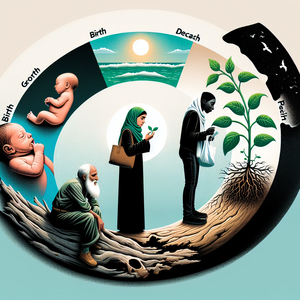The Great Gatsby and the American Dream: A Financial Illusion

Gatsby's meteoric rise to wealth is shrouded in mystery and suspicion. He is rumored to have gained his fortune through questionable means, such as bootlegging and gambling, suggesting a moral compromise in the pursuit of wealth. This raises the question: what does it truly mean to be successful in America? Gatsby’s fortune, while substantial, is built on illegal activities that reflect the darker side of the American Dream, where the ends often justify the means. His lavish parties, opulent lifestyle, and extravagant displays of wealth, such as his ostentatious mansion, serve as a façade that masks the deeper reality of his existence—one marked by unfulfilled longing and emotional void. For instance, despite hosting grand soirées attended by the elite, Gatsby remains isolated, revealing that wealth cannot buy genuine relationships or happiness.
Aspiration vs. Reality
Gatsby's relentless pursuit of wealth is intimately tied to his desire for acceptance, particularly from Daisy Buchanan. He believes that financial success will win her love and reestablish their past romance. This misguided belief highlights a significant aspect of the American Dream: the notion that wealth can buy happiness and social status. However, as the narrative unfolds, it becomes evident that despite his riches, Gatsby remains an outsider, unable to penetrate the elite circles of East Egg. His wealth does not grant him the authenticity or the emotional fulfillment he seeks; instead, it alienates him from genuine human connections. The infamous line, "You can't repeat the past," serves as a stark reminder that no amount of money can recreate lost love or restore the innocence of youth.
Corruption and Morality
The 1920s were a time of great economic expansion but also of significant moral ambiguity. Fitzgerald portrays a society obsessed with wealth, often at the expense of ethics and integrity. Gatsby's rise to fame is emblematic of this trend, as he navigates a world where success is measured by material possessions rather than personal virtue. The novel serves as a cautionary tale about the seductive nature of wealth and its corrupting influence. Characters like Tom Buchanan represent the moral decay of the elite, who wield their wealth without accountability, perpetuating inequality and social injustice. Tom's infidelity and abusive nature contrast sharply with Gatsby's idealistic vision of love, showcasing how wealth can corrupt not only individuals but also the moral fabric of society.
Social Mobility and Class Disparities
While Gatsby's story is one of aspiration, it simultaneously underscores the limitations of social mobility in America. His transformation from James Gatz, a poor farmer's son, to Jay Gatsby, a wealthy socialite, is remarkable yet ultimately unfulfilling. The rigid class structures of the time ensure that no matter how much wealth he accumulates, he cannot transcend the barriers imposed by birth and social status. The novel critiques the idea that the American Dream is equally accessible to all, revealing the stark realities of privilege and exclusion that persist beneath the surface of prosperity. Despite his efforts to reinvent himself, Gatsby's origins haunt him, culminating in his tragic fate and highlighting the futility of escaping one's past.
In "The Great Gatsby," Fitzgerald intricately weaves a narrative that challenges the very foundations of the American Dream. Gatsby's wealth, rather than being a symbol of success, becomes an illustration of the dream's corruption and disillusionment. The novel serves as a reminder that the pursuit of wealth, when disconnected from morality and human connection, can lead to emptiness and despair. Ultimately, Gatsby's tragic end underscores the notion that the American Dream, while alluring, often proves to be an illusion—a financial mirage that can blind individuals to the more profound truths of life and relationships. Through Gatsby's journey, Fitzgerald invites readers to reflect on the true meaning of success and the cost of chasing an ideal that may forever remain out of reach. In the end, the American Dream, represented by Gatsby's dream of being reunited with Daisy, illustrates the profound disillusionment that accompanies the relentless pursuit of wealth and status, revealing the hollowness that often lies beneath the surface of financial success.
Financial Analyst - Economic Impact Specialist
McKinsey & Company, Deloitte
Core Responsibilities
Analyze economic data to assess the impact of financial trends on market behaviors and consumer spending.
Prepare reports that link economic analysis with real-world implications, particularly in sectors influenced by wealth disparities.
Required Skills
Strong proficiency in statistical software (e.g., SAS, R) and data analysis techniques.
Excellent written and verbal communication skills to translate complex economic concepts into accessible insights.
Corporate Social Responsibility (CSR) Manager
Ben & Jerry's, Patagonia
Core Responsibilities
Develop and implement strategies that align corporate practices with ethical standards and social equity.
Monitor and report on the effectiveness of CSR initiatives, particularly in addressing wealth inequality and community engagement.
Required Skills
Strong understanding of social impact metrics and sustainability practices.
Exceptional project management and stakeholder engagement skills.
Wealth Management Advisor - Client Relationship Specialist
UBS, Morgan Stanley
Core Responsibilities
Provide personalized financial planning and investment strategies to high-net-worth individuals, focusing on long-term wealth preservation.
Educate clients on the implications of their financial decisions within the broader context of societal values and ethical investing.
Required Skills
Deep knowledge of financial instruments, investment strategies, and tax implications.
Strong interpersonal skills to build and maintain client relationships based on trust and transparency.
Cultural Critic - American Literature Focus
Core Responsibilities
Write and publish critiques and analyses of American literature, particularly works reflecting societal values and the American Dream.
Engage in public speaking and discussions on the implications of literature in understanding contemporary societal issues.
Required Skills
Strong analytical and writing skills, with an emphasis on literary theory and cultural studies.
Ability to connect literary themes with current socio-economic contexts.
Economic Policy Advisor - Social Equity Specialist
Brookings Institution, Urban Institute
Core Responsibilities
Advise government agencies and organizations on policies aimed at reducing economic inequality and promoting social mobility.
Conduct research and analysis on the effectiveness of existing policies in achieving equitable economic outcomes.
Required Skills
Extensive knowledge of economic theory, public policy, and social justice issues.
Strong analytical skills coupled with the ability to communicate policy recommendations effectively.


